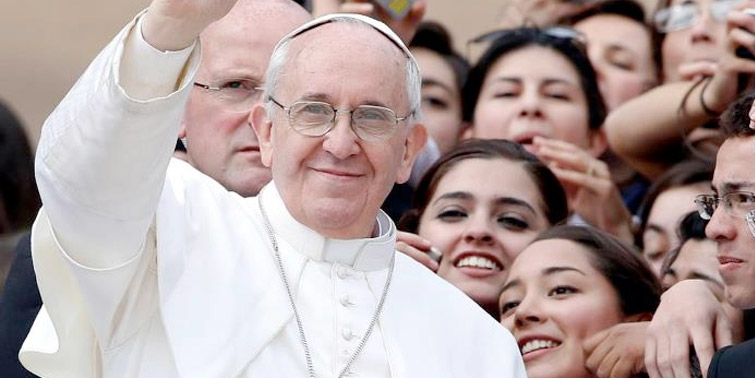Message from Pope Francis for World Mission Day 2015.
The Holy See Press Office has released Pope Francis’s message for World Mission Day 2015, to be celebrated on October 18th. Below we present the text, taken from vatican.va
[gdlr_space height=”30px”] [gdlr_quote align=”center” ]Cum sociis natoque penatus etaed pnis dis parturient montes, scettr aieo ridus mus. Etiam portaem mleyo.[/gdlr_quote] [gdlr_space height=”30px”]Dear brothers and sisters:
World Mission Day 2015 takes place within the context of the Year of Consecrated Life, and receives from this an encouragement for prayer and reflection. In fact, if every baptized person is called to give testimony to the Lord Jesus by proclaiming the faith received as a gift, this is particularly true for the consecrated person, because between consecrated life and mission there exists a strong bond. Following Jesus, which led to the emergence of consecrated life in the Church, responds to the call to take up the cross and follow him, to imitate his dedication to the Father and his gestures of service and love, to lose one’s life in order to find it. And since all of Christ’s existence has a missionary character, men and women who follow him more closely fully assume this same character.
The missionary dimension, being part of the very nature of the Church, is also intrinsic to every form of consecrated life, and cannot be neglected without creating a void that disfigures the charism. Mission is not proselytism or mere strategy; mission is part of the “grammar” of faith, it is essential for those who listen to the voice of the Spirit whispering “come” and “go”. Whoever follows Christ necessarily becomes a missionary, and knows that Jesus «walks with him, speaks with him, breathes with him. He perceives the living Jesus with him in the midst of the missionary task» (Exhort. ap. Evangelii gaudium, 266).
Mission is a passion for Jesus but, at the same time, it is a passion for his people. When we stop before Jesus crucified, we recognize all his love that dignifies and sustains us; and at that very moment we perceive that this love, born from his pierced heart, extends to the whole people of God and to all humanity; thus we rediscover that he wants to take us as instruments to reach ever closer to his beloved people (cf. ibid., 268) and to all those who seek him with a sincere heart. In Jesus’ command: “go” are present the always new scenarios and challenges of the Church’s evangelizing mission. In it, everyone is called to proclaim the Gospel through the testimony of life; and especially, consecrated persons are asked to listen to the voice of the Spirit, who calls them to go to the great peripheries of the mission, among the people to whom the Gospel has not yet reached.
The fiftieth anniversary of the conciliar Decree Ad gentes invites us to reread and meditate on this document that sparked a strong missionary impulse in Institutes of Consecrated Life. In contemplative communities, the figure of Saint Thérèse of the Child Jesus, patroness of missions, was revived with light and eloquence as an inspirer of the close link between contemplative life and mission. For many religious congregations of active life, the missionary zeal that emerged from Vatican II was launched with an extraordinary openness to the ad gentes mission, often accompanied by welcoming brothers and sisters from lands and cultures encountered during evangelization, so today we can speak of a widespread interculturality in consecrated life. Precisely for this reason, it is urgent to re-propose the ideal of mission at its center: Jesus Christ, and in its demand: the total donation of oneself to the proclamation of the Gospel. There can be no concession on this: who, by the grace of God, receives the mission, is called to live the mission. For these persons, the proclamation of Christ, in the various peripheries of the world, becomes the way to live following him and rewards the many efforts and sacrifices. Any tendency to deviate from this vocation, even if accompanied by noble motives related to many pastoral, ecclesial, or humanitarian needs, is not in harmony with the Lord’s personal call to service of the Gospel. In Missionary Institutes, formators are called both to clearly and honestly indicate this perspective of life and action and to act with authority in discerning authentic missionary vocations. I especially address young people, who remain capable of giving brave testimonies and performing generous feats sometimes against the current: do not let anyone steal your dream of an authentic mission, of following Jesus that involves the total donation of oneself. In the secret of your conscience, ask yourself what is the reason you chose the missionary religious life and measure your willingness to accept it for what it is: a gift of love in service of proclaiming the Gospel, remembering that, before being a necessity for those who do not know it, the proclamation of the Gospel is a necessity for those who love the Master.
Today, the mission faces the challenge of respecting the need of all peoples to depart from their own roots and safeguard the values of their respective cultures. It is about knowing and respecting other traditions and philosophical systems, and recognizing each people and culture’s right to be helped by their own tradition in understanding the mystery of God and in welcoming the Gospel of Jesus, which is light for cultures and a transforming force for them.
Within this complex dynamic, we ask ourselves: “Who are the privileged recipients of the Gospel proclamation?” The answer is clear and found in the Gospel itself: the poor, the little ones, the sick, those who are often despised and forgotten, those who have nothing to pay you back (cf. Luke 14:13-14). Evangelization, primarily directed to them, is a sign of the Kingdom that Jesus came to bring: «There is an inseparable link between our faith and the poor. Let’s never leave them alone» (Exhort. ap. Evangelii gaudium, 48). This must be especially clear for those who embrace the missionary life: with the vow of poverty, one chooses to follow Christ in this preference of his, not ideologically, but as he did, identifying with the poor, living like them in the precariousness of daily life and renouncing all power to become brothers and sisters of the last, bringing them the testimony of the joy of the Gospel and the expression of God’s charity.
To live the Christian witness and the signs of the Father’s love among the little ones and the poor, consecrated persons are called to promote, in the service of the mission, the presence of the lay faithful. The Second Vatican Ecumenical Council already stated: «Lay people cooperate in the evangelization work of the Church and participate in its saving mission both as witnesses and as living instruments» (Ad gentes, 41). It is necessary for consecrated missionaries to open themselves increasingly bravely to those willing to collaborate with them, even for a limited time, for on-the-ground experience. They are brothers and sisters who want to share the missionary vocation inherent in Baptism. The houses and structures of missions are natural places for their reception and support—human, spiritual, and apostolic.
The Missionary Institutions and Works of the Church are fully at the service of those who do not know the Gospel of Jesus. To effectively achieve this goal, they need the charisms and missionary commitment of the consecrated, but also, the consecrated need a service structure, an expression of the concern of the Bishop of Rome to ensure koinonia, so that collaboration and synergy become an integral part of the missionary witness. Jesus has placed the unity of the disciples as a condition for the world to believe (cf. John 17:21). This convergence does not mean a juridical-organizational submission to institutional organizations, or a mortification of the Spirit’s diversity, but rather, it aims to make the Gospel message more effective and to promote that unity of purpose which is also a fruit of the Spirit.
The Missionary Work of the Successor of Peter has a universal apostolic horizon. For this reason, it also needs the multiple charisms of consecrated life, to address the vast horizon of evangelization and to guarantee an adequate presence at borders and territories reached.
Dear brothers and sisters, the passion of the missionary is the Gospel. Saint Paul could affirm: «Woe to me if I do not proclaim the Gospel!» (1 Cor 9:16). The Gospel is a source of joy, liberation, and salvation for all men. The Church is aware of this gift, and therefore, does not tire of constantly proclaiming to everyone «what from the beginning we have heard, what we have seen with our own eyes» (1 John 1:1). The mission of the servants of the Word—bishops, priests, religious, and laity—is to put everyone, without exception, in a personal relationship with Christ. In the vast field of the Church’s missionary activity, every baptized person is called to live their commitment as best as possible, according to their personal situation. A generous response to this universal vocation can be offered by consecrated persons through an intense life of prayer and union with the Lord and his redemptive sacrifice.
While entrusting to Mary, Mother of the Church and missionary model, all those who, ad gentes or in their own territory, in all states of life, cooperate in proclaiming the Gospel, I send you with all my heart my Apostolic Blessing.
Vatican, May 24, 2015
Solemnity of Pentecost
Francisco










